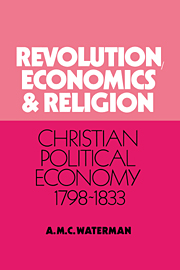Book contents
- Frontmatter
- Contents
- List of figures
- Acknowledgements
- Abbreviations
- 1 POLEMIC, IDEOLOGY AND ‘CHRISTIAN POLITICAL ECONOMY’
- 2 THE FIRST ESSAY ON POPULATION: POLITICAL ECONOMY
- 3 THE FIRST ESSAY ON POPULATION: THEOLOGY
- 4 THE RECONSTRUCTION OF MALTHUSIAN THEODICY: PALEY AND SUMNER
- 5 OXFORD CONTRIBUTIONS: COPLESTON AND WHATELY
- 6 CHALMERS AND THE ESTABLISHMENT
- 7 THE END OF CHRISTIAN POLITICAL ECONOMY
- Appendices: The Malthus–Chalmers model of stationary equilibrium
- Bibliography
- Index
6 - CHALMERS AND THE ESTABLISHMENT
Published online by Cambridge University Press: 27 August 2009
- Frontmatter
- Contents
- List of figures
- Acknowledgements
- Abbreviations
- 1 POLEMIC, IDEOLOGY AND ‘CHRISTIAN POLITICAL ECONOMY’
- 2 THE FIRST ESSAY ON POPULATION: POLITICAL ECONOMY
- 3 THE FIRST ESSAY ON POPULATION: THEOLOGY
- 4 THE RECONSTRUCTION OF MALTHUSIAN THEODICY: PALEY AND SUMNER
- 5 OXFORD CONTRIBUTIONS: COPLESTON AND WHATELY
- 6 CHALMERS AND THE ESTABLISHMENT
- 7 THE END OF CHRISTIAN POLITICAL ECONOMY
- Appendices: The Malthus–Chalmers model of stationary equilibrium
- Bibliography
- Index
Summary
THOMAS CHALMERS AND THE ‘GODLY COMMONWEALTH’
‘See Dr Chalmers' excellent Work on Endowments’, noted Whately in the preface to his Introductory Lectures (1831, X). His advice contains, in the smallest possible compass, the essence of Chalmers's contribution to Christian Political Economy.
This is not to say that the particular book referred to – On the Use and Abuse of Literary and Ecclesiastical Endowments (1827), a copy of which Chalmers had presented to Whately when they met at Oxford in 1830 (Hanna 1849–52, III, 278–9, 288–9) – contains the clearest or the fullest statement of Chalmers's position. It is rather that his chief contribution to the ideological alliance between political economy and Christian theology consists of an altogether novel defence of the established churches in the British Isles. For during the final decades of the ancien régime there was mounting attack upon the establishment in church and state, particularly upon the Churches of England and Ireland. And Chalmers – not to put too fine a point upon it – attempted to prove by means of economic theory that church establishment was the only way to raise the condition of the poor and so to make the world safe for property.
With the solitary exception of his ill-starred National Resources (1808), Chalmers's intellectual achievements were distinctly inferior in quality to those of his predecessors considered in this book. Yet far more has been written about him, especially in the way of biography, than any, with the possible exception of Malthus.
- Type
- Chapter
- Information
- Revolution, Economics and ReligionChristian Political Economy, 1798–1833, pp. 217 - 252Publisher: Cambridge University PressPrint publication year: 1991
- 1
- Cited by

